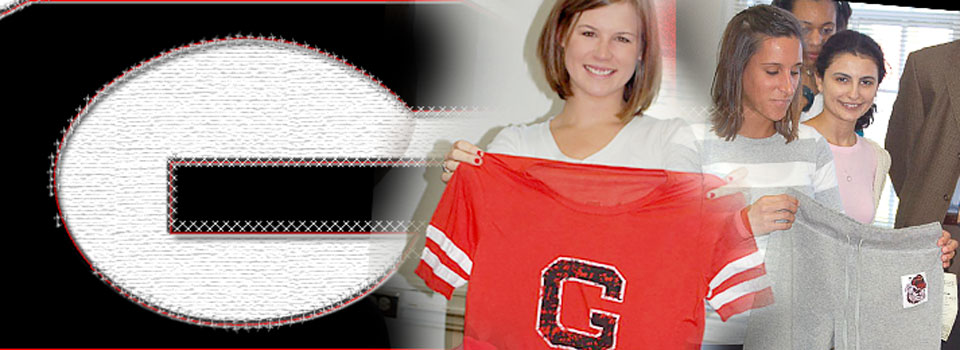When shoppers head to the UGA Bookstore later this month, they’ll be able to purchase more than the usual textbooks and candy bars. In addition to those items, they’ll have the opportunity to buy apparel designed by UGA fashion merchandising students.
The red vintage, jersey-style T-shirt and charcoal cropped sweatpants were produced by students in courses taught by Charles Gilbert, Distinguished Professor of Soft Goods Merchandising and Manufacturing in the College of Family and Consumer Sciences. Gilbert joined the faculty in 2006 after many years in the textile manufacturing industry and has drawn on those experiences for the courses, “Survey of Apparel and Soft Goods Manufacturing,” and “Global Sourcing of Apparel and Textile Products.”
“I wanted the students to learn from start to finish what it means to make a product,” Gilbert said. “The class that designed the T-shirt focused on domestic manufacturing while the other class worked with suppliers located in China.”
The process began the first day of class when students’ first homework assignment was to go shopping.
“I wanted the students to see what was missing from the shelves of their favorite stores and see what was in demand by shoppers,” Gilbert said. The result is retro-inspired clothing that has the comfort and softness of a favorite garment.
The T-shirt, made of organic pima cotton grown in the US, spun only 20 minutes away in Jefferson by Buhler Yarns, was knit, cut, sewn, dyed, and screen-printed in Pennsylvania by Fessler U.S.A., a totally “Made In The U.S.A.” product.
The pants, on the other hand, were produced solely in China.
“The students get to see every tiny cost of production, especially overseas,” Gilbert said. “They have to pay duty and quota costs along with air freight, all of which add up to an additional $5.66 per garment to the wholesale price.”
The result of those added costs mean that the sweatpants will sell for $40, while the T-shirts are only $29.
“I never realized how much work and detail went into making a garment, especially when you source the garment from another country,” Kristin Bledsoe, a senior from Fayetteville, stated. “You have to take into consideration the language barrier, time differences, availability of the fabrics and quota restrictions.”
In addition to determining the details of each product and arranging to have them produced, the students also had to gain permission from the UGA Athletic Department to use the trademark “G” and the bulldog mascot on their garments.
Fortunately, Alan Thomas, associate athletic director for external affairs, thought the designs were highly marketable.
“The retro look is the hottest thing going in licensed garments,” Thomas said. “I think you ladies have a real winner.”
The garments, offered in limited quantities, will be sold at the UGA Bookstore and by members of the class until supplies run out. But Gilbert plans on next semester’s classes producing new products.
“Most of these students will be merchandisers or buyers for the retail industry,” Gilbert said. “These courses will make them better merchandisers and buyers with the knowledge they have gained on design, production, and sourcing; but it also gives them more avenues in their careers such as apparel designers, suppliers, and sourcing agents.”
